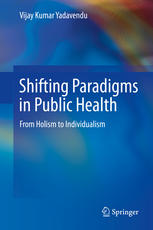تغییر پارادایم ها در سلامت عمومی: از کل نگر به فردگرا ۲۰۱۳
Shifting Paradigms in Public Health: From Holism to Individualism 2013
دانلود کتاب تغییر پارادایم ها در سلامت عمومی: از کل نگر به فردگرا ۲۰۱۳ (Shifting Paradigms in Public Health: From Holism to Individualism 2013) با لینک مستقیم و فرمت pdf (پی دی اف)
| نویسنده |
Vijay Kumar Yadavendu |
|---|
| تعداد صفحهها |
203 |
|---|---|
| نوع فایل |
|
| حجم |
1 Mb |
| سال انتشار |
2013 |
89,000 تومان
معرفی کتاب تغییر پارادایم ها در سلامت عمومی: از کل نگر به فردگرا ۲۰۱۳
این جلد بین رشته ای تکامل پارادایم های بهداشت عمومی را در طول اعصار در یک زمینه جهانی خلاصه می کند و استدلال می کند که به نظر می رسد سلامت عمومی دلیل وجودی خود، یعنی دیدگاه جمعیت را از دست داده است. اولین رویکرد فلسفی به بهداشت عمومی شامل یک درک جامع و مبتنی بر جمعیت بود که بر تاریخچه و ارتباط متقابل مطالعه سلامت و بیماری در لنگرهای اجتماعی، اقتصادی و سیاسی بزرگتر آنها تأکید داشت. سنت جدید که در اواخر قرن نوزدهم پس از پذیرش نظریه میکروب در پزشکی شکل گرفت، تحولات مثبتی در اپیدمیولوژی ایجاد کرد. در قالب عوامل خطر، مدل تقلیل گرای سلامت و بیماری در اپیدمیولوژی بالینی و مولکولی فراگیر شده است.
نویسنده نشان می دهد که چگونه پوزیتیویسم و مفهوم فردگرایی از تفکر بهداشت عمومی حذف شده است که تأثیرات تاریخی، اجتماعی و اقتصادی را در نظر می گیرد که بروز بیماری و مداخلات انتخابی جمعیت را شکل می دهد. شایان ذکر است که غفلت از رویکرد چندعاملی در اندیشه بهداشت عمومی معاصر منجر به افزایش نابرابری های سلامت در کشورهای توسعه یافته و در حال توسعه شده است. او همچنین پیشنهاد می کند که مفهوم «سرمایه اجتماعی» در سلامت عمومی، که به عنوان تجدید شمول پذیری مورد ستایش قرار می گیرد، در واقع یک نسخه در حال تکامل و توسعه یافته از فردگرایی است.
نویسنده نتایج و تأثیرات منفی سیاست عمومی اتخاذ فردگرایی سیستمی را از طریق بحث در مورد سیاست های ایدز ارائه می دهد. این کتاب به شدت برای درک جامع و ادغام دیدگاه حقوق در سلامت عمومی برای دستیابی به عناصر عدالت اجتماعی و برابری در تدوین سیاست بحث می کند.
This transdisciplinary volume outlines the development of public health paradigms across the ages in a global context and argues that public health has seemingly lost its raison d’être, that is, a population perspective. The older, philosophical approach in public health involved a holistic, population-based understanding that emphasized historicity and interrelatedness to study health and disease in their larger socio-economic and political moorings. A newer tradition, which developed in the late 19th century following the acceptance of the germ theory in medicine, created positivist transitions in epidemiology. In the form of risk factors, a reductionist model of health and disease became pervasive in clinical and molecular epidemiology.
The author shows how positivism and the concept of individualism removed from public health thinking the consideration of historical, social and economic influences that shape disease occurrence and the interventions chosen for a population. He states that the neglect of the multifactorial approach in contemporary public health thought has led to growing health inequalities in both the developed and the developing world. He further suggests that the concept of ‘social capital’ in public health, which is being hailed as a resurgence of holism, is in reality a sophisticated and extended version of individualism.
The author presents the negative public policy consequences and implications of adopting methodological individualism through a discussion on AIDS policies. The book strongly argues for a holistic understanding and the incorporation of a rights perspective in public health to bring elements of social justice and fairness in policy formulations.



